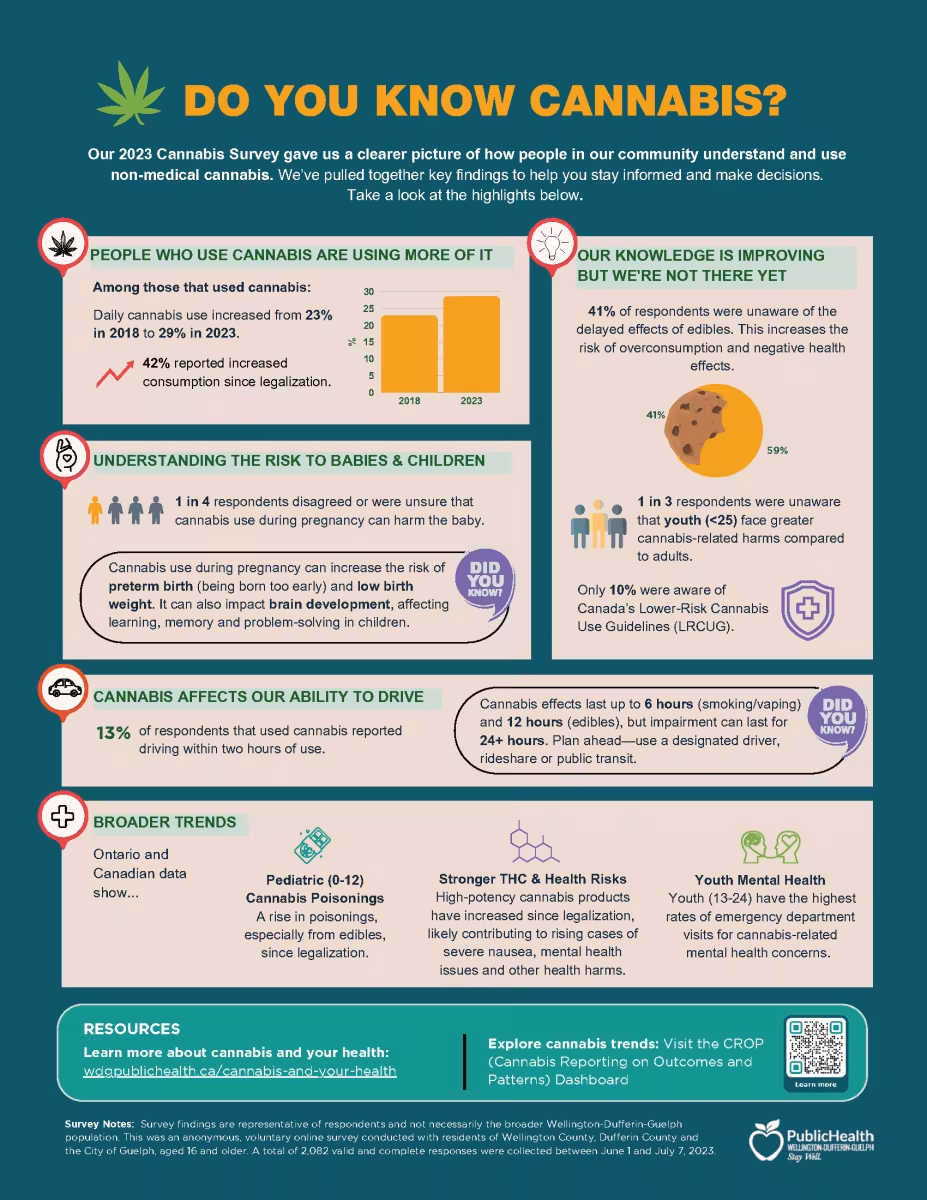
Do You Know Cannabis?
This week marks seven years since cannabis became legal in Canada. A lot has changed about our relationship with cannabis since 2018, including the way we talk about it, use it, and understand its effects. But what does that look like here in Wellington County, Dufferin County and the City of Guelph?
In 2023, over 2,000 community members took part in The WDG Public Health Cannabis Survey. The survey gave us a better picture of how people in our region think about and use non-medical cannabis today, including: what’s changed, what we’re curious about and where knowledge gaps still exist.
We’ve highlighted key survey findings below. For a deeper dive, we’ve also created a new infographic and interactive dashboard that makes it easy to explore the data, find local supports and access additional resources.
Thank you to everyone who took part in the survey. Your feedback helps us better understand health issues at the local level and guides the work we do at public health.
Findings From the 2023 Cannabis Survey

Results reflect non-medical cannabis use in our community and were compared to our 2018 survey, before cannabis was legalized.
How has cannabis use changed?
Among respondents who had used cannabis in the past year:
- 29% said they use it daily, an increase from 23% in our 2018 survey. Frequent cannabis use can increase the risk of health harms.
- Daily cannabis use was highest among respondents ages 16 to 24.
- 42% said they’re using more cannabis since legalization. The most common reasons were that it’s now legal, easier to get and more socially accepted.
How we’re using cannabis has also changed. Among respondents that used cannabis in the past year:
- Edible products like gummies, baked goods, and chocolate have grown in popularity—rising from 52% in 2018 to 67% in 2023.
- Cannabis-infused drinks, including sparkling water, soda, tea, and coffee, saw a notable increase—from 5% in 2018 to 26% in 2023.
- Smoking cannabis remains the most common method, though it’s on the decline—dropping from 86% to 70% over the same period.
What do we know about cannabis?
Our knowledge of cannabis has improved since 2018, an encouraging finding. However, there are still some areas we can continue to improve on.
Of all survey respondents:
- 41% didn’t know that edibles can take 30 minutes to 2 hours to kick in. This delay can increase the risk of overconsumption and negative reactions if someone takes more too soon.
- 1 in 4 didn’t know that cannabis use during pregnancy can harm the baby.
- Only about 1 in 10 were aware of Canada’s Lower-Risk Cannabis Use Guidelines—a helpful set of recommendations designed to reduce the health risks linked to cannabis use.
When it comes to cannabis and driving, most respondents were aware of the risks, but some still drove after using:
- 90% of respondents knew that using cannabis increases the risk of a motor vehicle collision (car accident).
- 13% of individuals that used cannabis in the past year said they had driven within 2 hours of using it.
Cannabis can affect your coordination, reaction time and judgment, with some effects lasting for up to 24 hours or more. There’s no way to know exactly when it’s safe to drive. It’s always best to plan ahead - use a designated driver, rideshare or public transit.

Impacts on youth are greater
Cannabis can affect anyone’s health, but young people are more at risk. That’s because the brain continues to develop until around age 25. Using cannabis before then can affect memory, learning, attention and decision-making. It can also increase the risk of addiction (dependency) and mental health issues.
From our 2023 survey:
- About 1 in 3 respondents didn’t know that youth under 25 face greater health risks from cannabis than adults.
- Among individuals that used cannabis in the past year, about 1 in 4 said they first used it at age 16 or younger.
Find out more about how cannabis affects young people.
Why these findings matter
We launched this survey to better understand how cannabis is being used and understood right here in Wellington-Dufferin-Guelph.
Cannabis has been legal in Canada since 2018, and we’re still learning about how that’s affecting people in our region. This survey provides data we can use to track trends over time and make sure our efforts continue to align with local needs.
Most importantly, these results help shape our work, from education to outreach, so we can better support the health and well-being of everyone in our community.
Let's keep the conversation going
Thank you for being part of this important conversation. Whether you're a parent, a health professional or want to learn more about cannabis, we hope this information has given you something useful to take away.
Have more questions? Visit our cannabis dashboard, website or connect with us on our social media.
